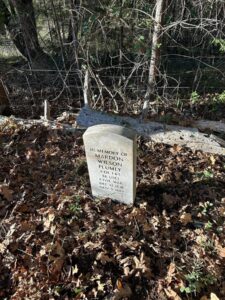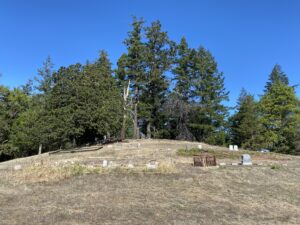A USCT Colonel’s Voluntary Demotion
“Both my sons have been in the army from the beginning. They are in it, yet,” Benjamin Rush Plumly, chairman of the Board of Education for Freedmen in the Department of the Gulf and a noted abolitionist, wrote to President Abraham Lincoln in March 1865. He explained that his sons had served as privates for many months before earning promotions based on merit, emphasizing that he never requested their promotion or advancement. His youngest son, Mardon, had entered the service under his late friend, Col. Edward D. Baker, with whom he helped raise a regiment. “That son worked his way to a Colonelcy, and to an acting Brigadiership,” he proudly wrote. “He served three years and four months, and left the service. Being out three months, he re-enlisted, as a private, and so I hear, this week, has been promoted for gallantry in action, and is on his way ‘up’ again.”

Mardon Wilson Plumly (also spelled Plumley) attended Jefferson Medical College in Philadelphia, Pennsylvania, before enlisting as a private in the 71st Pennsylvania Infantry (originally raised as the 1st California) in June 1861. He served with Col. Baker’s regiment at the Battle of Ball’s Bluff, where 312 of the 520 soldiers engaged became casualties, and Baker himself was killed. At the Battle of Fair Oaks, the regiment lost another 96 men, followed by 68 more during the fight at Savage Station the next day. After these heavy losses, the regiment was reorganized, and in July 1862, Plumly was appointed as a second lieutenant in the 40th New York Infantry, also known as the “Mozart Regiment.”
At the Battle of Second Bull Run in August, Plumly was wounded in the left side of his chest. He resigned in November, suffering from chronic diarrhea that had plagued him for the past year, leaving him unfit for duty.
Through the influence of his father, who was involved in raising colored troops in the Department of the Gulf, Plumly was appointed colonel of the 7th Regiment, Louisiana Infantry (Colored) on July 10, 1863. However, the regiment was mustered out after only 60 days. Consequently, Plumly was appointed as colonel of the 86th Regiment, U.S. Colored Infantry, which was organized in New Orleans.
He commanded a brigade for a time, but when he learned that a board of examination would evaluate each officer in the newly raised U.S. Colored Infantry units in the department, Plumly resigned his commission as colonel.

“I feel that although I have received a common English education, and have served in the United States Army as an enlisted man and officer for more than three years,” he explained to Assistant Adjutant General George B. Drake on July 18, 1864, “I shall not be able to pass so rigorous an examination in all branches of education as is required by the General Order requiring my appearance before the above mentioned Board.”
On December 29, 1864, Plumly enlisted as a private in the 1st Louisiana Cavalry and was later promoted to sergeant. However, on June 13, 1865, he was reduced back to private. He was honorably mustered out in August.

After the war, Plumly moved to Sonoma County, California, settling in the township of Salt Point. He served for a time as justice of the peace and contributed to the Sonoma Democrat under the pseudonym “Veritas.” On November 5, 1889, Plumly died of an undisclosed illness, possibly from the lingering effects of his war service, at his home near Fort Ross, at the age of 45. A member of Sea View Lodge No. 295, a local chapter of the Independent Order of Odd Fellows, Plumly was buried at Sea View Cemetery.
When I visited the remote cemetery in 2021, I had received permission beforehand from the Peter Michael Winery, as I needed to cross private property to access it. The cemetery had reportedly been donated to the now-defunct town of Sea View and is maintained by Annie Cresswell and her husband, who live on a ranch across the road. Her family owns the last remaining historic building from the original town of Sea View. A veteran headstone now honors Plumly at the cemetery, which is located about four miles north of the Fort Ross State Historic Park, the southernmost Russian settlement in North America.
Feature image of Corps d’Afrique recruitment card, circa. 1865, from Hindman Auctions.
Shrouded Veterans is a 501(c)(3) nonprofit organization dedicated to rescuing the neglected graves of 19th-century veterans, primarily Mexican War (1846-48) and Civil War (1861-65) soldiers, by identifying, marking, and restoring them. You can view more completed grave projects at facebook/shroudedvetgraves.com.
Frank, I admire your research and writing ability! Thanks for all you are doing!
Thanks, Bill! I really appreciate it. I’ll be sharing some interesting Mexican War projects on my Facebook page soon. I’m slowly working through the list of all the American officers who served during the war and where they are buried.
Fine job. The headstone reads “In Memory Of.” That inscription signifies that the remains are not buried there. Normally, that sort of inscription is used for MIA deaths and cases such as burial at sea or body donated to science.
Thanks, Bill! You are correct: “In Memory of” on a veteran’s headstone indicates that the veteran isn’t buried in the cemetery. In this case, all evidence suggests Plumly would have been buried there, but the cemetery’s burial records are lost. The VA would only approve a stone that read “In Memory of,” so I had to settle for that. I’m just happy there’s a marker in this remote cemetery honoring him where he lived and died.
Thank you, very interesting story, compelled me to look at some newspaper articles. (1) General Appraiser “B. Rush Plumly, who has a son in the regiment” rode with Baker and the regiment on the march to the Philadelphia piers (Sacramento Daily Union, 27 Jul 1861, p 4); (2) Lincoln offered Major B. Rush Plumly a Brigadier-Generalship, Lincoln said, “Stanton says you don’t want the straps.” Plumly replied, “I know how to recruit men, but not how to command them” (Daily Alta California, 17 May 1880, p 1; (3)”Major B. Rush Plumly” made a passionate speech regarding Jews before the Texas legislature (a Republican and friend of Lincoln) (Sonoma Democrat, 1 Jun 1872, p 1).